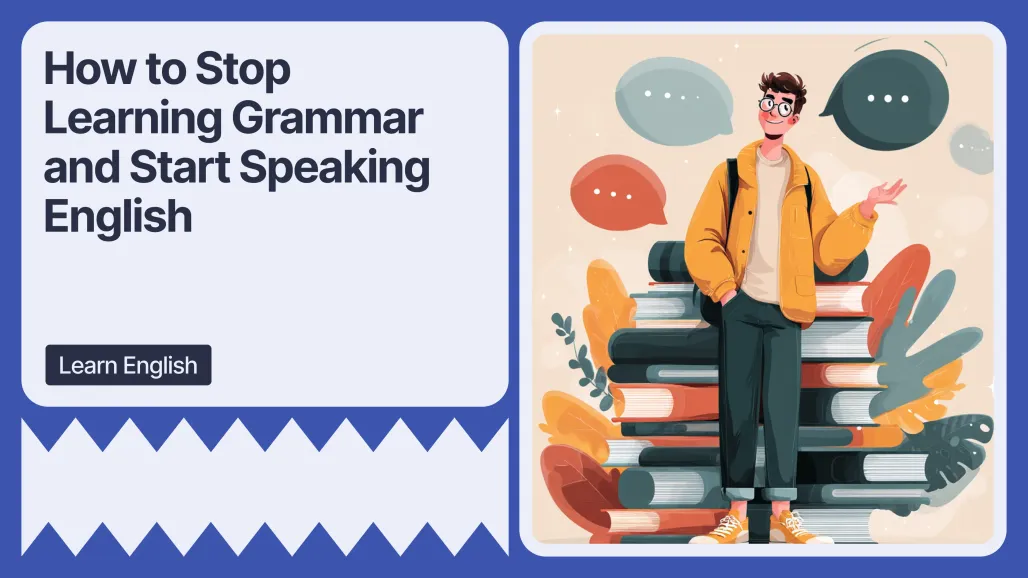How to Stop Learning Grammar and Start Speaking English

Stop studying grammar—start speaking! Use TV, apps, clubs, and self-talk to build real English fluency, confidence, and fun.
So, you’ve memorized all the tenses. You know the difference between “will have been eating” and “had been eaten.” You’ve finished your grammar book, maybe twice.
And yet… when someone asks you, “What’s up?”, your brain freezes, your mouth forgets what a verb is, and all you can manage is a nervous smile and maybe a polite “Yes.”
Sound familiar?
If you’re stuck in grammar land and can't seem to cross the bridge into actually speaking English, you’re not alone. Good news? It’s totally fixable. And probably more fun than you think.
Let’s talk about how to ditch the grammar drills (just a little) and start talking like a real human.
📺 1. Binge-Watch Your Way to Fluency
You read that right. Watching TV can actually help.
Choose shows where people speak real, everyday English. Sitcoms like Friends, Brooklyn Nine-Nine, or The Office are gold. Why? Because they’re full of casual conversations, slang, jokes, and expressions people actually use.

Here’s the trick:
- Watch with English subtitles first.
- Then, watch again without them.
- Finally, try repeating some of the lines out loud. (Yes, out loud. Even if your cat looks at you funny.)
This is called shadowing—you’re copying the rhythm, pronunciation, and flow of native speakers. And guess what? It works.
📚 2. Do “Immersive Reading” (No, It’s Not a Spa Treatment)
Immersive reading just means reading and listening at the same time. Get an audiobook and follow along with the text, or pick an immersive book in WholeReader app. This helps connect the sounds of English with the way it’s written—and improves your pronunciation without you even trying.
Try easy novels, short stories, or even children’s books. There are also adapted (simplified) books if you don't feel confident enough to read original texts yet:

Bonus: you’ll pick up grammar naturally, the way kids do. Without any scary worksheets.
🗣 3. Join a Speaking Club (or Start Your Own)
Speaking is a muscle. If you don’t use it, it stays weak.
Search online for local or virtual English speaking clubs. These are safe places where everyone is learning, so no one’s judging your weird preposition choices.
No club nearby? No problem.
- Find a language partner on apps like Tandem or HelloTalk.
- Join English Discord or Reddit communities.
- Organize a weekly Zoom chat with other learners.
Even talking to your dog in English every day is better than staying silent. Really.
🧠 4. Think in English (Yes, Your Brain Can Do It)
Start with small stuff:
- “I need coffee.”
- “It’s cold today.”
- “I should probably do laundry.”
The more you train your brain to think in English, the easier it becomes to speak without translating. No more pauses. No more “Umm, what’s the word again?”
Make English your brain’s second language, not your homework project.
🎤 5. Talk to Yourself. A Lot.
Before you say “That’s weird”—hear me out.
Narrate your day:
“I’m brushing my teeth. I'm going to the store. Why am I still in my pajamas?”
This builds fluency and confidence. You’re practicing sentence structure, vocabulary, and pronunciation—without an audience. No pressure. No grammar police.

🛑 Bonus Tip: Stop Obsessing Over Mistakes
Native speakers mess up all the time. (Ever heard someone say “I ain’t got none”? Yeah.)
Fluency isn’t about being perfect. It’s about being understood. The more you focus on communicating, the faster you’ll improve.
Mistakes are just stepping stones. Step on them proudly.
Final Thoughts
Grammar is a tool—not a cage. You don’t need to master every rule before you open your mouth.
Language is messy. It’s human. It’s meant to be used, not just studied.
So go ahead: watch a show, read a story, talk to yourself, join a club, yell at your plants in English. The more you speak, the more natural it becomes.
And one day soon, someone will ask you, “How’s it going?”—and you’ll answer without thinking.
And that will be your moment.

